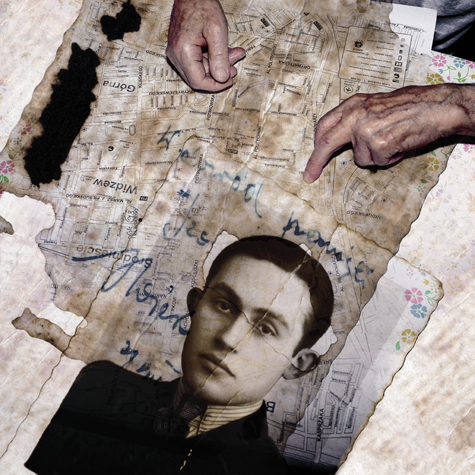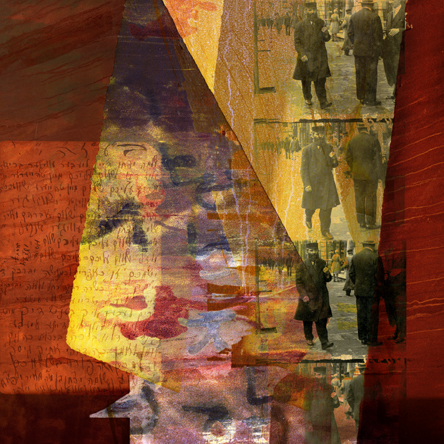Leslie Starobin, Boston, USA
Leslie Starobin is a tenured Professor of Communication Arts at Framingham State University in Framingham, Massachusetts. Since 2011, Starobin has been on the academic advisory board of the Hadassah Brandeis Institute at Brandeis University in Waltham, MA. Throughout her career, Starobin has been recognized for her photography, montage artwork, and writing. Most recently, she was awarded an Honorable Mention from the Center for Documentary Studies at Duke University in Durham, NC for their 2013 CDS Documentary Essay Prize. Starobin’s 2012 eBook, Inheritance: Stories of Memory and Discovery, was supported in part by grants from the Center for Excellence in Learning, Teaching, Scholarship and Service at Framingham State University. In 2008 and 2009, the Hadassah Brandeis Institute at Brandeis University awarded Starobin research grants to support “The Last Address: Traces of Family and History in Memory and Montage.” Starobin was awarded First Prize for Digital Imaging in the Richard Nagler Photography Competition held by the Judah L. Magnes Museum (University of California at Berkeley) in 1999. Starobin received a photography fellowship from the New England Foundation of the Arts/Massachusetts Cultural Council in 1995, and two fellowships from the Memorial Foundation for Jewish Culture from 1993-?94. In 1990, she received an honorarium from the Duke University Art Museum. Starobin received a Kinnicutt Travel Grant from the Worcester Art Museum in 1988, and an Artist’s Fellowship from the National Endowment for the Arts in 1984. Starobin had a solo exhibition entitled “Inheritance: Stories of Memory and Discovery” at the Holocaust Museum Houston. In 2010, the Yad Vashem Museum in Israel selected Starobin’s photomontages for inclusion in its upcoming international database of artists who have explored the Holocaust in their work. Starobin’s photographic and montage work is in the permanent collection of many American museums, including the Danforth Museum, Framingham, MA; Duke University Museum of Art, Durham, NC; Fogg Art Museum, Harvard University, Cambridge, MA; Jewish Museum, NY, NY; Museum of Fine Arts, Houston, TX; Museum of Modern Art, NY, NY; and the Rose Art Museum at Brandeis University in Waltham, MA.
Portrait of Marek Lodz
Around 1925, in a Polish studio Memories from Miedzyrzec was born, and the solemn expressions of two identically clad sisters were recorded for posterity. When the photographer released the shutter, the future was unimaginable to these delicate souls. Once the negative was developed, printed, and mounted on cardstock, Mania and Blima practiced their penmanship on its backside. Their childhood signatures are still visible today.
How this family picture survived World War II to be returned to their mother’s hands—considering her flight from Nazi occupied Poland and subsequent Soviet imprisonment—is a mystery. “It was only after my mother and grandmother had both passed away,” Mania’s daughter said, “that I discovered these photographic treasures memorializing their lives, before the war.” In my montage Bella’s Bliss a Polish mother lovingly holds her baby. A snowflake of lace caresses the two, and the color palette is soft and gray. In my montage Mania and Blima the sisters are enveloped in the folds of a brown fur coat—Mania’s matronly mink—foreshadowing the darkness about to suffocate Europe and rob Blima of her short life.
Memories from Miedzyrzec is one mini-series making up The Last Address, a multi-year photomontage project exploring the enduring texture of memory and culture in the lives of families from dispersed Jewish communities around the world. What makes The Last Address distinct is that these still-life montages are composed from the personal belongings salvaged by families under unimaginable distress, and often in flight –like Mania’s family. A high school portrait found five decades after the man graduated from a Polish gymnasium– the only likeness to commemorate his Polish boyhood. His manhood begin with a flight to the Soviet Union. In the montage Portrait of Marek, Lodz 1929, Tel Aviv 2003 an octogenenarian on the eve of his ninetieth birthday points out his childhood haunts on a Polish map of Lodz. He is seated at a table in the Tel Aviv apartment he has occupied for more than a half a century. Other montages from the series include a baby album smuggled out of Germany in 1938, like the baby, Eveline. A small library of classics and a cache of negatives packed by newlyweds on route to Shanghai, the last port of entry open to this Berlin couple in 1939. A miniscule family snapshot rolled up and hidden inside a Russian cigarette by a Polish Jewish officer sent to the Gulag, during World War Two. A pen and ink of a French Resistance leader interned in multiple concentration camps—the artist was undoubtedly a fellow prisoner—smuggled from one camp to the next until liberation.
Intricately woven into the montages are also garments bequeathed to the next generation, in memory. From one dusty New England attic came a concentration camp uniform, a Royal Air Force uniform worn by a female linguist spying for the British, and a four generational Tunisian bridal trousseau complete with studio photographs of the betrothed. From Beirut there was a Bar Mitzvah tallis, from Karachi a sari, from Miedzyrzec a gold watch, and from Kiev a fur satchel. Stuffed inside was a Russian keepsake memorializing the loves ones left behind—an envelope with the last address an American immigrant family in Malden, MA had for their relatives in Kiev who perished during WW II.

Shop Windows of History, 2005
“…peace puts on a scary mask of war, and war changes its ways to peace. And we who dwell within her are displayed in the shop windows of history with a wardrobe of peculiar fashions and frozen gestures…”
My current work –a series of digital photomontages – straddles the crossroads between analog and digital, photography and painting, fact and fiction, past and present, war and peace. These compositions also fuse biographical and autobiographical elements related to personal and world history. The turbulent and evolving geo-political landscapes of Eastern Europe and the Middle East, two regions of the world to which I have ancestral and family ties, have shaped my vision and iconography.
As I chart my family tree from the dusk of the nineteenth century to the dawn of the twenty-first century, I have unearthed a tangled cluster of cultural-identity roots. Artifacts discovered in numerous family archives reveal a wealth of material in multiple languages and alphabetic scripts. Family identification cards and passports – sometimes readable in my images - take on weighted significance in historic context, as the signatories often were fleeing oppressive regimes and war torn landscapes to uncertain locales. These people were caught between war and peace - like the words from the (above) poem “Jerusalem, Jerusalem, Why Jerusalem?” written by Yehuda Amichai, an Israeli poet. The incorporated signs and symbols are drawn not only from family archives, but also from shop windows, local graffiti, monuments and memorials, and other found objects I have photographed on various trips abroad. This visual inventory includes precious art and artifacts I have photographed at a wide array of sculpture gardens and international museums from the Hermitage to the Israel Museum. An actual sculpture garden in Moscow, created since the fall of communism, contributed to the inspiration for many of these works, as did an emotional journey I made to Starobin, Belarus. Here I visited/photographed a Nazi massacre site and a medical treatment center for children made sick by radioactive fallout from the Chernobyl nuclear plant.
As a contemporary artist, I am creating both photographs and digital montages, which weave together the complex multi-national and personal sources informing my artistic and cultural identity. The series Shop Windows of History is inspired by places steeped in family memory, enriched by artistic and literary tradition, and central to world history and current events.
Leslie Starobin June 2005

Saba Meir’s I.D. – Palestine, 1946/Tel Aviv1997, 1998
Features an identification card from the time of the British Mandate in Palestine. The card permits the young man depicted in the photograph to reside in Tel Aviv, but states “possession of this card in no way constitutes evidence of legal residence in Palestine.” Although the original card was like tissue paper, worn and thin, it was as strikingly pink, as historic, and as old as the Afula wall with which it is matched.
Leslie Starobin's artist's statement on her website
Collections
Danforth Museum, Framingham, MA
Duke University Museum of Art, Durham, NC
Fogg Art Museum, Harvard University, Cambridge, MA
Jewish Museum, NY, NY
Judah L. Magnes Museum, Berkeley, CA
Museum of Fine Arts, Houston, TX
Museum of Modern Art, NY, NY
National Jewish Museum, Washington, DC;
Rose Art Museum, Brandeis University, Waltham, MA
Smith College Museum of Art, Northampton, MA
Yad Vashem Museum, Israel
Books
Inheritance:Stories of Memory and Discovery by Leslie Starobin, 2012. (eBook available on iTunes)









